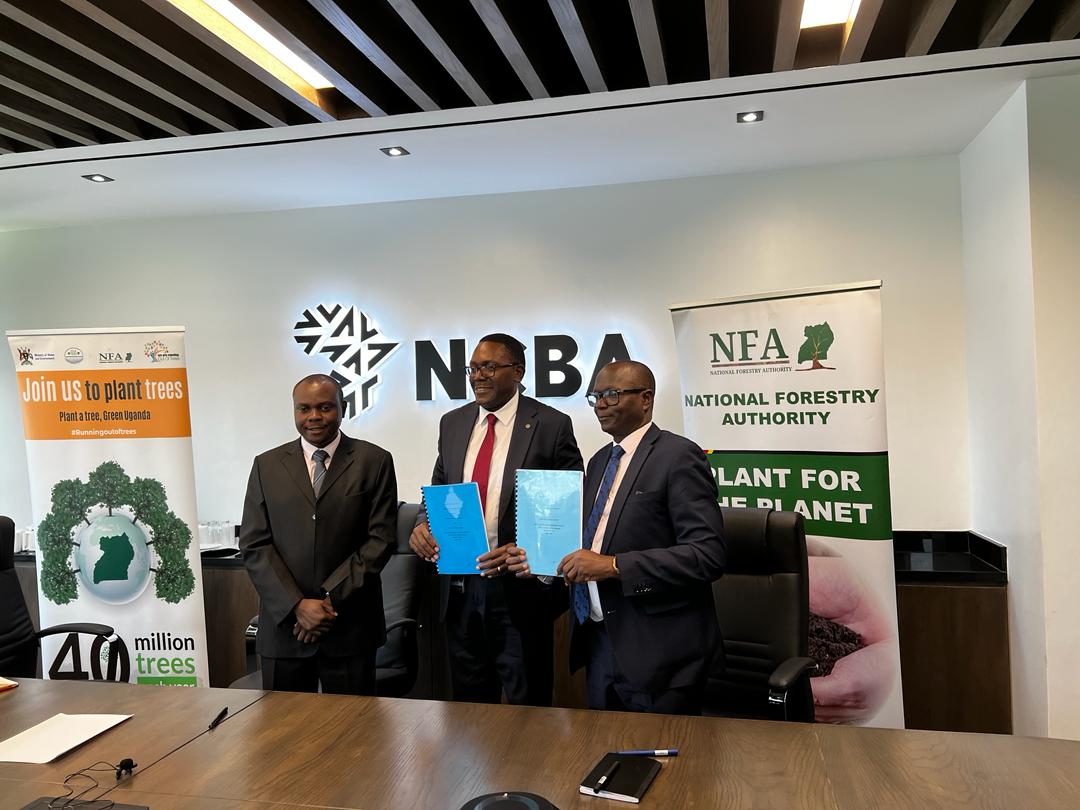NCBA Bank , NFA partner to plant 20,000 trees

NCBA Bank Uganda has marked a significant milestone in its journey towards environmental sustainability through a new partnership with the National Forestry Authority (NFA) aimed at planting 20,000 trees in 2024 equivalent to 30 hectares.
The trees will be planted at Jubiya Forest Reserve in Masaka, as part of the bank’s “Change the story" initiative, aimed partly at restoring the degraded parts of the forest.
Keep Reading
According to NFA, Uganda has seen a significant loss in forest cover, with approximately 41.6% lost since 1900, primarily due to human and economic activities such as agriculture, wood fuel, and animal grazing. Despite this alarming trend, about 88% of Ugandans still rely on wood fuel for cooking, exerting immense pressure on our forests.
Uganda’s forest cover has in the last 25 years seen a severe decrease in forest cover from 4.9 million ha (24%) to 2.5 million ha (12.4%) (NFA, 2018). This corresponds to an annual average forest cover loss of 122,000 ha or 2% of which 65% percent of this loss occurs on private land (NFA, 2018)
. In order to address the situation, the Ministry has embarked on a nation-wide tree planting campaign dubbed “Running Out of Trees, (ROOTs)” whose key highlight is an annual National Tree Planting Day where 40million trees will be planted and nurtured by the 40million Ugandans.
The planting target is mainly indigenous and fruit trees for their ecosystem and nutritional value.
The program is specifically intended to promote forest protection, tree growing, reforestation and afforestation across the different landscapes. The Campaign is premised on Uganda’s 2016 pledge to the Bonn Challenge based on the Restoration Opportunities Assessment to restore 2.5million hectares of degraded forest landscapes by 2030
Against this backdrop, NCBA Bank Uganda says it is taking proactive steps to address these pressing issues through its "Change the story" initiative.
One of the key pillars of this initiative is the minimization of our direct impact on the climate and the amplification of our tree planting program.
According to Mark Muyobo, the Chief Executive Officer, NCBA Bank Uganda's dedication to sustainability extends beyond emissions reduction to include tree planting activities that deliver tangible and lasting benefits, such as carbon appropriation, employee engagement, and community empowerment.
Speaking on Tuesday, during the media launch of the partnership with NFA, at the bank’s head offices in Kampala, Muyobo said through strategic partnerships, direct financial support, and rigorous monitoring and evaluation, NCBA Bank Uganda aims to plant 10 million trees by 2030, making a lasting impact on the environment and communities.
“As NCBA Bank Uganda, we recognize the integral role of tree planting in addressing climate change and preserving natural ecosystems. Our tree growing activities are characterized by tangible and lasting benefits, including carbon appropriation, employee engagement, and community empowerment,” Muyobo said.
Muyobo added that the bank has also completely eliminated single-use plastic from its operations, reflecting its dedication to reducing its environmental footprint and fostering a culture of sustainability within the NCBA community.
“As we journey towards sustainability, we are committed to greening our supply chain and transforming corporate gifting practices. By prioritizing sustainable sourcing methods and embracing eco-friendly alternatives, we aim to minimize our environmental impact while fostering meaningful connections with stakeholders,” Muyobo said.
He stressed that the bank is committed to reducing its direct emissions by more than 50% by 2030, to be achieved through a series of activities in 2024, including transitioning to renewable energy sources, and exploring various system improvements.














